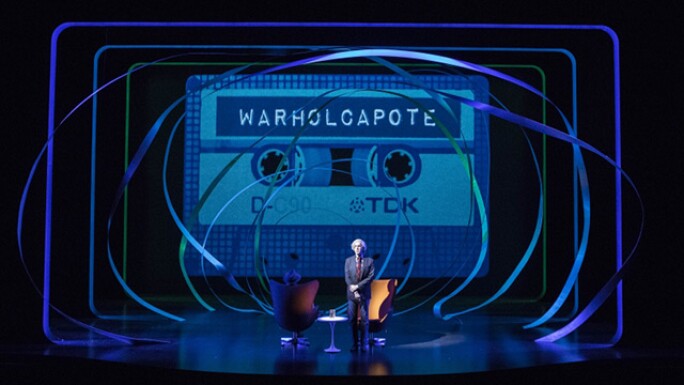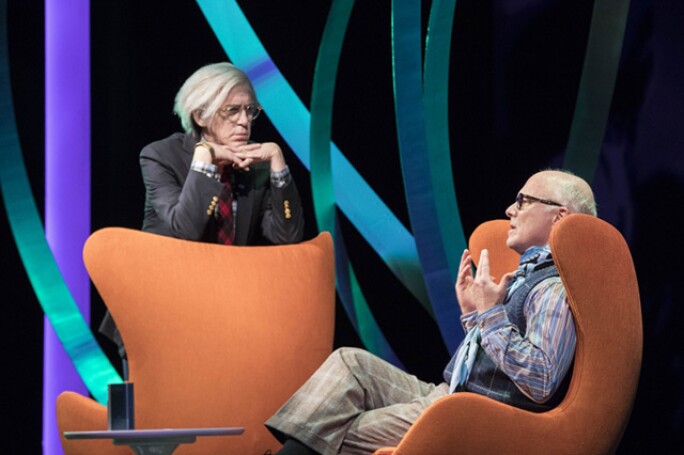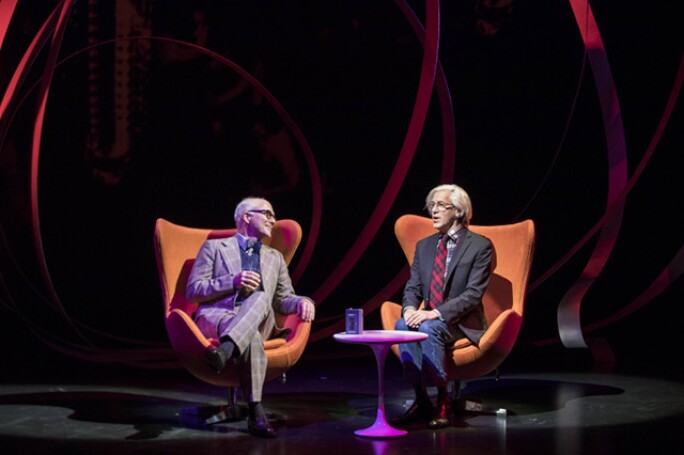
Many famous artists leave little record of their personal lives. Andy Warhol was not one of them. Warhol chronicled his existence through written diaries and thousands of hours of audio recordings – information that answers questions but raises others, often through a piece of a larger narrative that has still not been fully revealed. It was just such a tantalizing fragment that inspired playwright Robert Roth to realize Warhol and Truman Capote’s unfinished collaboration on a Broadway play. Based on more than 80 hours of previously embargoed conversations between the two friends, Roth’s WARHOLCAPOTE premiered last September at the American Repertory Theater in Cambridge, Massachusetts. Actors Roger Bart and Dan Butler will play Warhol and Capote respectively in an exclusive performance on 13 May at Sotheby’s New York, followed by a conversation between Roth and specialist Eric Shiner, formerly the director of The Andy Warhol Museum in Pittsburgh. Ahead of that event, Shiner talked with Roth about the challenges of bringing these two personalities to the stage.

Eric Shiner: What was the genesis of this project?
Robert Roth: About 11 years ago, a friend invited me and my then-boyfriend, now-husband, to go on a cruise. Before we left, I brought as vacation reading a brand-new copy of the Andy Warhol Diaries, which I had read – I’m not exaggerating – fifteen times before.
ES: Isolated on a boat, did you discover something you missed those fifteen other times?
RR: Yes! The entry said, and I’m paraphrasing, “went to Truman’s apartment, got six good tapes for the play.” And I thought, the play? What play? I realized I had to find those tapes.
ES: How did you track them down?
RR: I called Vincent Fremont, who ran Andy Warhol Enterprises, and he remembered Andy talking a lot about writing a play with Truman Capote. Vincent also told me that The Warhol had a collection of tapes, so we called Matt Wrbican, the archivist there, who confirmed that they had thousands of cassettes.

ES: Andy talked on the phone constantly and was thrilled about recording his conversations. The Warhol Museum has more than 5,000 of those tapes from the 1960s onward. Were these all telephone conversations?
RR: They were in-person conversations, too. Andy kept a Walkman in his pocket – he called it his wife. Matt Wrbican would eventually find 59 90-minute cassettes labeled “Truman” in Andy’s handwriting but he was initially not allowed access to the tapes. In the 1960s and 1970s it was illegal to surreptitiously record people, so The Andy Warhol Foundation placed was an embargo on the recordings until 2037 – 50 years after Andy’s death. But it occurred to me that Truman knew he was being recorded, and that made all the difference.
ES: How long did it take for you to get through all the tapes and complete the script?
RR: It took seven months to get the tapes. I had them digitized and was then obliged to have them transcribed by a bonded court reporter for 100 percent accuracy. I spent five years writing the play.

ES: The dialogue between Capote and Warhol must have been extraordinary. What did they say to each other?
RR: The recordings were varied – one was Andy and Truman in a car going to an antique store; in another they were with dinner guests at a soirée in Texas. Those were fascinating, except I only had rights to use their conversations about the play. Then I got to the tape where Andy suggests they should collaborate. And Truman says, “that sounds great, Andy, what should we do?” and Andy says they should write seven Broadway plays that would all run at the same time, and the plot would be about gay cosmonauts. Then Truman tells him, “be serious.” So Warhol said, “I think I should just tape you, and the edited tapes should be the play.” And after a minute, Truman agreed, because the edited tapes would be “both real and imagined.”
ES: It’s as if they were telling you what to do.
RR: I took their actual words, filtered them through my creative imagination, and the result is a play called WARHOLCAPOTE. It was very much in line with their approach to art. Warhol used real photographs of Marilyn Monroe for his silkscreens, and Capote based In Cold Blood on the true story of a murdered family. They each transformed reality into art.
ES: Although their senses of humor bordered on the dark and macabre, they were both truly funny people, something I don’t think they’re known for. In terms of acerbic wit, who wins between the two of them?
RR: Capote.
ES: How did audiences respond to the initial performances of WARHOLCAPOTE last fall?
RR: The audience response was very gratifying. That’s no credit to me. It’s all Andy and Truman, friends and 20th-century geniuses. They talked privately, and I got to hear it – and now the world gets to listen.
Learn more about the creation of WARHOLCAPOTE:

